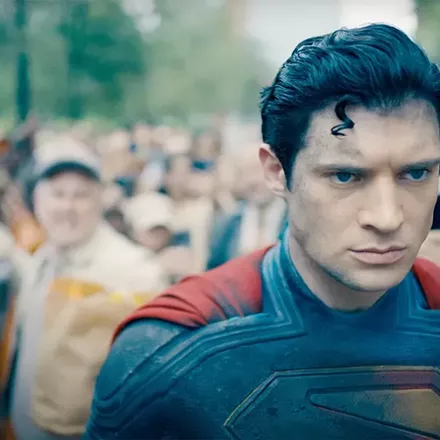Not All ...
Men gets a bit too smug about its metaphorical gender politics.
By Scott Renshaw @scottrenshawAs the credits rolled on writer/director Alex Garland's Men, I found myself imagining a version of the movie that was not titled Men. In all other ways, it would be exactly the same movie, not a frame of film or a note of music in any way changed. It would simply be called something else, maybe Country Manor or The Garden or seriously literally anything else. Maybe that would change the sledgehammer sense of obviousness in its central metaphor. Or maybe it wouldn't, but dear God, it could have been worth a try.
Because Men, while clearly meant as a work of provocation, didn't need to be nearly so smug about it. As a work of unsettling horror, it's often terrific, queasy-making both in its images and in its ideas. It simply feels, once that title slams onto the screen at the end, that it's practically daring you not to find it profound in its nightmarish view of gender politics. Garland might as well have given Men the post-colon subtitle Amirite, Ladies?
There's a simply compelling set up at the foundation of all of this, involving a Londoner named Harper (Jessie Buckley) who heads out to the country for a two-week rental of a lavish country manor. A deeply traumatizing event involving her husband James (Paapa Essiedu) continues to haunt her, and once she gets the key from the house's owner, Geoffrey (Rory Kinnear), she hopes for some peace and quiet. Then she encounters a mysterious naked man in the nearby woods. And then her encounters with every man in the general vicinity becomes somehow unnerving.
As the trailers for Men tipped us off, part of what's unnerving about those encounters is that every male character besides James—a naughty schoolboy; the local vicar; the police officer who answers her emergency call—has the same face, Kinnear's face, though Harper herself never seems to be aware of that fact. That by itself is a bold gambit, with Garland effectively saying, "yep, all men, that's my point exactly." The varying roles played by those same-faced men, digging into all kinds of fraught territory—like victim-blaming, white-knight-ing and making women responsible for men's lustful thoughts—hold plenty of promise on their own, but it's like Garland's physical representation of those men is acting as his own Cliffs Notes for the script, running a highlighter over each significant line.
The damned shame of it is, Men is also a reminder of what an extraordinarily gifted filmmaker he is. As he showed in Ex Machina and Annihilation, Garland can craft truly striking images, and create disturbing moments that make you want to crawl out of your own skin. His ability to build tension is on masterful display in an early sequence where Harper, out exploring the house's surroundings, finds herself at the mouth of a tunnel, playfully experimenting with its acoustics ... until things get weird. From the lighting schemes he employs to the subliminal face that appears when a phone connection goes bad, Men works its way into your brain in a way that simply can't be dismissed.
But Garland is also fighting against a story that feels awfully cock-sure about the fact that you won't be able to dismiss it. The visual touchstones he employs at various times—sculpted images representing fertility symbols, the fruit of an apple tree, dandelion seeds flying and taking root—plead with you to appreciate that something deep is going on, just like the vicar's recitation of Samuel Daniel's poem "Ulysses and the Siren." The climactic sequence isn't particularly subtle about the perpetuation of cycles of behavior, though it's still a memorably gruesome piece of work. And as effectively as Buckley is able to convey both her mounting anxiety and her anger over feeling guilt about someone else's choices, Harper exists mostly as a representation herself rather than a complete character—Woman serving as counterpoint to the Men.
Still: How much of this frustration has to do with Garland's title punching you in the mouth with what it's all about? What is it here that we wouldn't quite grasp without it? Even a provocation at some point needs to trust its audience to pick up what it's laying down. The problem with Men isn't so much that it suggests every man can't be trusted; it's more the way the decision to call it Men tells everyone who watches that they can't be trusted, either.
More by Scott Renshaw
-
Film Reviews: New Releases for July 11
Superman, Abraham's Boys, Sovereign, Kill the Jockey
- Jul 10, 2025
-
Ranking all the Superman movies
Ahead of the new feature, a look at nearly 50 years of the Man of Steel on screen.
- Jul 9, 2025
-
Art exhibitions for July 2025
Scout Invie's First Rodeo, Sandy Brunvand's Ecotone, Mitsu Salmon's Erosion and Becoming, new exhibitions at Utah Museum of Contemporary Art and more.
- Jul 9, 2025
- More »
Latest in Film Reviews
Readers also liked…
-
Sundance 2025 wrap-up plus February special screenings
Uncertainty about the future location shifts focus away from the movies
- Feb 5, 2025





